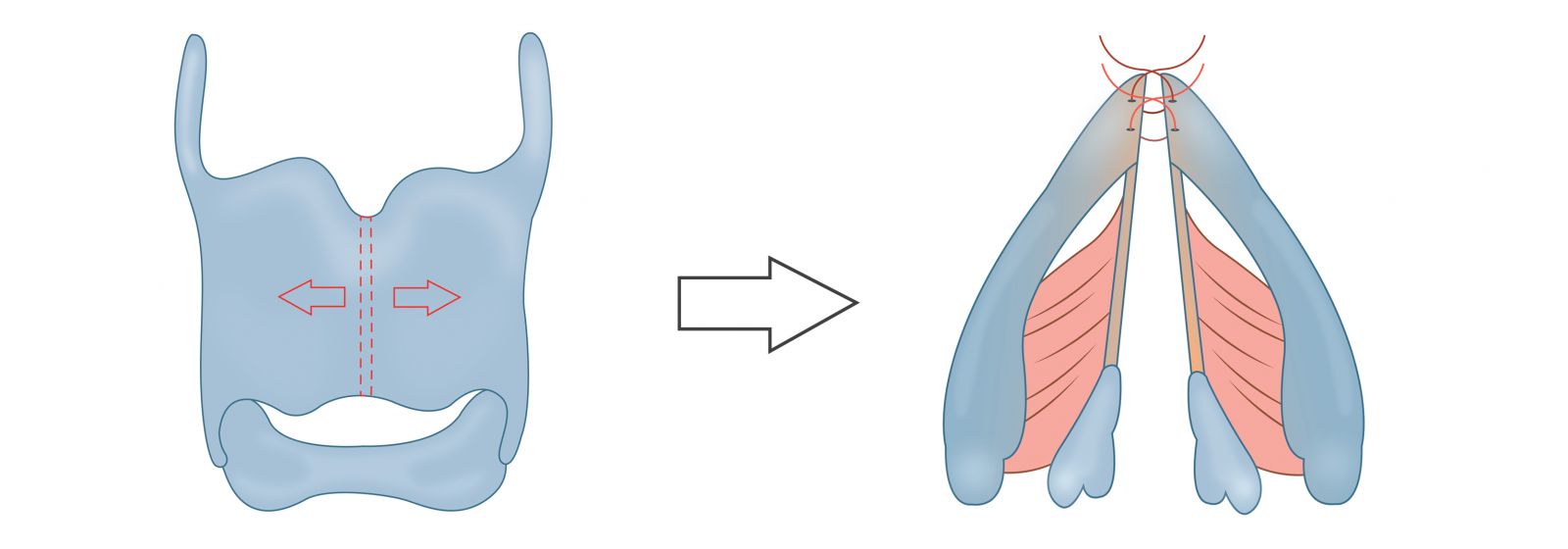Female to Male Voice Surgery or Voice Masculinization Surgery / VMS in Bangkok, Thailand
This type of surgery is performed if the patient is not satisfied with his voice despite the use of male hormone therapy. Unlike the female voice, a lower fundamental frequency of the voice is associated with men.
Before the surgery, an accurate Video Laryngostroboscopy and spectrum-acoustic study of the voice will be performed to highlight the natural and fundamental frequency and to plan the best operation to achieve the patient's goals.
A masculine voice is low-frequency, around 100-125 Hz, which is lower than the average frequency for men's voices.
The surgical technique involves a 2-3 cm incision in the neck area. The external laryngeal structure is identified, and the diameters are reduced. The vocal folds are shortened to make the voice deeper and lower pitch.

Picture 1 shows reduced laryngeal diameter.
This technique is very safe and doesn’t interfere with your vocal fold.
After the operation, you can feel mild dysphagia, phlegm in your throat, and lumpness.
You should be admitted to the hospital for 1-2 nights for this procedure.
Post-operative Care for Voice Masculinization Surgery
- Day 1 to 7: You must remain silent until the first follow-up. There are no food and drink restrictions.
- Day 3 to 7: Keep the vocal cords lubricated by drinking lots of water and nebulize with a sterilized saline solution.
- Day 8 to 10: A new videolarygostroboscopic and spectrum-acoustic study is performed after the vocal rest period. The outer stitches are removed, the dressing is changed, and the speech therapy rehabilitation can start.
The speech therapist will teach the patient how to use her new voice as effectively as possible. The final result will be seen between the third and eighth month after surgery. For this reason, a follow-up is recommended at the third, sixth, and twelfth months after surgery.
Note: The surgical team reserves the right to assess the feasibility case by case if the upcoming patient has already undergone the voice change surgery using a different technique and is not satisfied with the result of their voice.
To prevent acid reflux, it’s highly recommended to avoid caffeine, chocolate, peppermint, fatty foods, acidic foods, soda, and alcoholic drinks.
One week off from work is sufficient as long as you can follow the voice restrictions. Two weeks off are required if your voice is needed.
Risks and Complications for Voice Masculinization Surgery
- Scar at neck
- Infection around the area of injury
- Hematoma and edema
- Necrosis and bruising
- Pain after surgery
- Voice hoarseness
- Sounds not change < depend on patient factors>
Voice Masculinization Speech Therapy
Voice masculinization speech therapy is a treatment to refine your voice, making it sound more masculine. The treatment must be done before and after the voice masculinization surgery to provide effortless speech control. Before voice masculinization surgery, your voice must be assessed and tuned to give you a proper speech. After voice masculinization surgery, you must learn to masculinize your voice and speak effortlessly. A specialized, skilled speech therapist provides this program, and it includes multiple sessions of practice until you complete all aspects of voice feminization therapy under the guidance of our speech therapist. Practicing without the specialist's advice may result in edema of your vocal cords and can cause a failure in our training program.
Getting to Know for Voice Masculinization Surgery (VMS)
How to take care of a patient after voice surgery
Taking care of a patient after voice masculinization surgery is crucial to ensure a smooth and successful recovery.
Why does Voice become Gender Identity?
Voice is indeed an important aspect of gender identity for many individuals.In the context of transgender
Why does smoking make your voice terrible?
Smoking is detrimental to voice surgery and can have several negative effects on the surgical outcome.
Video : Voice Masculinization Surgery / VMS
Tricks to get a clear voice
Here are a few tips to help improve the clarity of your voice:
- Hydrate: Drinking plenty of water can help keep your vocal cords lubricated, making life-changing it more accessible to speak clearly.
- Warm-up: Just like athletes warm up before a big event, it's a good idea to warm up your voice before speaking for a long time. This can include exercises such as humming, lip trills, and tongue twisters.
- Use good posture: Maintaining good posture can help you breathe more efficiently and improve the clarity of your voice. Stand up straight, keep your shoulders back, and keep your head held high.
- Use good breathing technique: Diaphragmatic breathing can help to support your voice and improve its clarity. This involves breathing deeply into your diaphragm instead of shallowly into your chest.
- Speak at a moderate pace: Speaking too quickly can make it difficult for others to understand you, while speaking too slowly can make you sound monotonous. Try to find a pace that feels natural and comfortable for you.
- Use appropriate volume: Speak loud enough to be heard but not so loud that your voice strains.
- Avoid speaking when you are congested or have a sore throat: If your vocal cords are inflamed, it can be challenging to speak clearly.
- Avoid smoking, excessive alcohol, and caffeine. All of these can dry out your vocal cords and make speaking more difficult.
- Practise good vocal hygiene, including singing like a warm-up, avoiding overusing your voice, and taking breaks to rest it.
Remember, speaking is a skill that can be developed and improved over time with practice and attention to technique.
Frequently Asked Questions (FAQs)
A: Voice masculinization surgery (VMS) is a surgical procedure designed to lower the pitch of your voice. It's a type of gender-affirming surgery that can help trans men, transmasculine individuals, and other gender-diverse people feel more comfortable and confident with their voice.
A: VMS typically involves a procedure called thyroplasty type III. This involves making an incision in your neck to access your voice box (larynx). The surgeon then adjusts the tension and position of your vocal cords to create a lower pitch.
Essentially, the procedure shortens and relaxes the vocal cords, making them vibrate at a lower frequency, which thus results in a deeper voice.
A: While voice therapy and hormone therapy can be effective for some, they don't always achieve the desired results for everyone. VMS offers a more permanent solution for those who:
- Have not achieved a satisfactory voice pitch with hormone therapy alone.
- Find voice therapy challenging or time-consuming.
- Desire a more significant and lasting change in their voice.
A: At Kamol Cosmetic Hospital, we offer several advantages for those who are considering voice masculinization surgery:.
- Experienced Surgeons: Our surgeons are highly skilled and have significant experience in performing VMS with exceptional results. They have a deep understanding of the anatomy and function of the vocal cords.
- Advanced Facilities: We boast world-class facilities and use the latest and greatest in surgical techniques for your safety and comfort throughout.
- Comprehensive Care: We will provide quality personalized care and support throughout your surgical journey, from the initial consultation to your post-op recovery.
- Competitive Pricing: The female to male voice surgery at Kamol Cosmetic Hospital is competitively priced, especially when compared to some other countries.
- Convenient Location: Bangkok is a beautiful and welcoming city with so much to see and do, making it an ideal destination for medical tourism.
A: To be a good candidate, you should:.
- Be in good overall health.
- Be a non-smoker or willing to quit.
- Have realistic expectations about the outcome of the surgery.
- Have completed any necessary voice therapy.
- Have a supportive mental health professional who can provide a letter of recommendation for your surgery.
A: During your consultation, you'll have the opportunity to:.
- Talk about your voice goals and expectations with the surgeon.
- Have a thorough voice assessment, including recording your voice and analyzing its pitch and quality.
- Review your full medical history.
- Discuss the surgical technique and any potential risks and complications.
- Ask any other burning questions you may have about the procedure.
A: Your surgeon will provide you with detailed pre-operative instructions:.
- Giving up smoking.
- Avoid taking certain medications and supplements that can increase the risk of bleeding.
- Abstaining from food for a specified period before the surgery.
A: Recovery from VMS is generally well-tolerated. You can expect:
- Some swelling and discomfort in the neck area, which can be managed with medication.
- Temporary voice limitations, such as hoarseness or difficulty speaking loudly.
- To follow specific post-operative instructions regarding voice rest, diet, and wound care.
- To attend follow-up appointments with your surgeon and a speech-language pathologist to monitor your healing and voice progress.
A: As with any surgery, VMS carries some potential risks and complications, including:.
- Bleeding.
- Infection.
- Scarring.
- Voice changes, such as hoarseness or breathiness (though these are usually temporary).
- Difficulty swallowing.
- Breathing difficulties (rare).
Your surgeon will discuss these risks with you in detail and rest assured they will take the necessary steps to minimize them.
A: You may notice an immediate change in your voice after surgery, but it will take time for your voice to fully stabilize and for you to learn how to use it effectively.
You'll work closely with a speech-language pathologist during your recovery to best-optimize your voice and communication skills in this crucial recovery stage.
A: Yes, voice therapy is an important aspect of the recovery process after voice masculinization surgery. Doing so will help you:
- Learn how to use your new voice effectively.
- Improve your vocal strength and endurance.
- Develop healthy vocal habits.
- Address any specific voice concerns or challenges.
A: In addition to VMS, we offer a comprehensive range of gender-affirming surgeries, including:
- Facial Masculinization surgery (FMS).
- FTM Hysterectomy.
- Mastectomy (Top Surgery).
- Phalloplasty.
A: VMS is generally considered a permanent procedure. While some minor adjustments may be possible with further surgery, it's not always feasible to completely reverse the effects.
As such, we cannot stress enough how important it is for you to carefully consider your final decision and discuss your goals and expectations thoroughly with your surgeon before committing.







